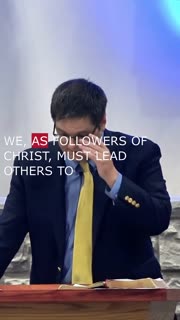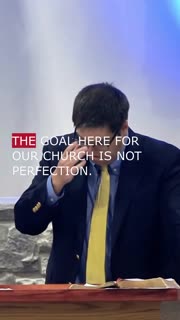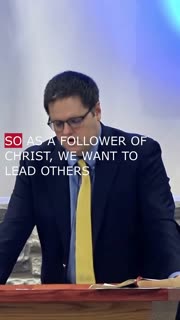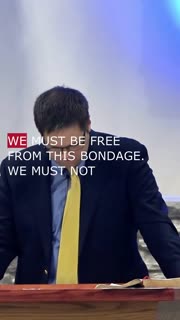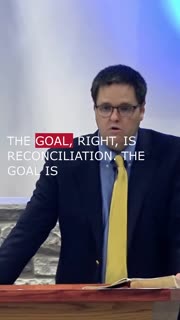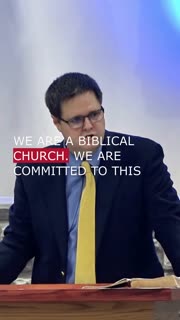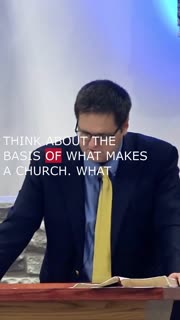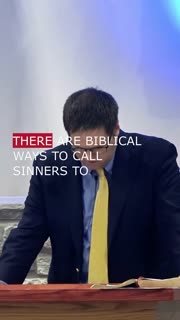Restoring Relationships Through Biblical Church Discipline
Devotional
Sermon Summary
Bible Study Guide
Sermon Clips
1) "We, as followers of Christ, must lead others to Christ. We must lead people to freedom. We don't want to keep people in bondage, keep people lost. That is an unbiblical, un Christ like thing to do. So we all have a responsibility here for direct application to God's word here. So, before we read these verses, I want to ask the question, why does Jesus make these commands? Why does Jesus make us do spiritual discipline? Because he knows his sheep, right? He knows, according to Isaiah 53 six, Romans 323, that all have fallen short of the glory of God and that we have, all, we all, like sheep, have gone astray. Every single one of us have turned to our own way." [02:26] (53 seconds)
2) "The goal here for our church is not perfection. We're all trying to live under the forgiveness and the mercy of God. We need to become more like Christ. Christ is the standard. We must fix our eyes on him. As we read earlier in Hebrews twelve, Jesus humbled himself from the throne of heaven. Where did we come from? We came from Dustin. Jesus lived 33 years of righteous living. You and I can't go two minutes without sinning. Jesus suffered affliction from sinners, sinners who were provided authority to inflict suffering upon our savior. Jesus suffered that, and we can't even imagine. We cannot even imagine that kind of suffering. And at the same time withholding so much strength, so much strength that God had." [03:44] (53 seconds)
3) "So as a follower of Christ, we want to lead others to Christ. We want to lead people to freedom. Freedom from a life of being mastered by sin. Freedom to approach the throne of God with no guilt as men. Freedom to look at your wife and your family in the eye and be Christ for them. Freedom to move and have your being under the banner of Christ. This is freedom. This is a worthy cause. It's part of the mission of our church in biblical discipleship." [07:28] (41 seconds)
4) "We must be free from this bondage. We must not tolerate each other's sin. We must disciple one another. We must conform ourselves to the image of Christ. Romans 829. Romans 829. We should live our life as coram deo, which is Latin for in the presence or in the face of God. Wherever we are, wherever we are, private, public, we should live our life as Coram deo. God does not tolerate sin. We often see the father's love for his son and we take advantage of that, do we not? We often think that God's love is directly applied to us without any intermediary. We have. Sometimes it's a tendency to have a low view of Christ and a high view of ourselves. And we think that we can go about our life, and as long as no one else knows, that's okay." [15:19] (71 seconds)
5) "Why is telling your brother in private good? Well, there's a confronting of sin with the individual, and there's a cleansing of the individual and the church back into purity. So there's a confronting of sin and there's a cleansing of the sin within the individual and the church and it comes back into purity. This is done not because of the work of your repentance, but for the work of Christ is when we become back in alignment with him and back in alignment and become pure. What happens to one impacts the whole. What you do in private impacts your marriage, impacts the church. If you're not married, your unholy living will also ripple through the church." [16:57] (47 seconds)
6) "The goal, right, is reconciliation. The goal is always reconciliation. We do not take joy in Satan ripping up on someone who's been inside this church, who's heard our preaching, who's sung our songs, who. We've done things together. We do not take joy of Satan ripping up on someone who's been inside. But we want them back. We want them back for them to come back in repentance. This is very, very right. I want to pay attention to one word here. In one corinthians five and verse eleven, the word reviler. I think we need to understand what reviler means in this church. Reviler is someone who uses abusive mannerisms and words and slander of another. It doesn't matter who, if you're using abusive mannerisms and language and words slandering anyone in this church, whether they're in leadership or they're a child, the range goes in and all over the place. You are a reviler." [27:24] (71 seconds)
7) "We are a biblical church. We are committed to this process. Spiritual discipline. Spiritual discipline is extremely precious and becoming more and more rare these days as most churches are trending to large megachurches, even remote online services where there is zero to no spiritual discipline. It's more of a masking of sin. And then churches get surprised when one day, all of a sudden one of their leaders or someone who've been teaching all of a sudden comes to the surface. Sin comes to the surface and they're like, whoa, where did this come from? Well, let me guess. Your church did not exercise spiritual discipline. If sin is not dealt with, there is no repentance and sin will devour the person and the church. We need to take sin seriously for the sake of Christ, if you love your brother." [30:26] (56 seconds)
8) "Think about the basis of what makes a church. What makes a church is mostly three things, three basic fundamentals that makes up a church. The preaching of God's word. That's a declaration. It's a preaching of God's word. The administration of the ordinances of baptism and Lord's supper. That's a declaration. There's an individual declaration in baptism, and there's an individual communal declaration of the Lord's supper where we remember him. And the third thing that makes up a church is an exercising spiritual discipline. It is a declaration. That's what makes up a church. As I would say, one of the key rules of a church is to declare. Not to stay silent and make everyone happy and make sure we can all go our own way. And no, we declare. We declare Christ in accordance to his word, his full word." [39:38] (61 seconds)
9) "There are biblical ways to call sinners to repentance. We have to do it biblically. Most importantly, we have to do it. We have to call sinners to repentance inside the church and outside the church. We must lead people to Christ, lead people to freedom. I say this. Why is this important? Because the name of Christ is at stake. When the name of Christ is cast off to the side and not honored, then the gospel is not declared. The role of the church is to declare the word of God. When there's no spiritual discipline, this declaration diminishes. It's just like, what's the point? What are we doing here if there's no spiritual discipline?" [49:35] (47 seconds)
Ask a question about this sermon
2) "The goal here for our church is not perfection. We're all trying to live under the forgiveness and the mercy of God. We need to become more like Christ. Christ is the standard. We must fix our eyes on him. As we read earlier in Hebrews twelve, Jesus humbled himself from the throne of heaven. Where did we come from? We came from Dustin. Jesus lived 33 years of righteous living. You and I can't go two minutes without sinning. Jesus suffered affliction from sinners, sinners who were provided authority to inflict suffering upon our savior. Jesus suffered that, and we can't even imagine. We cannot even imagine that kind of suffering. And at the same time withholding so much strength, so much strength that God had." [03:44] (53 seconds)
3) "So as a follower of Christ, we want to lead others to Christ. We want to lead people to freedom. Freedom from a life of being mastered by sin. Freedom to approach the throne of God with no guilt as men. Freedom to look at your wife and your family in the eye and be Christ for them. Freedom to move and have your being under the banner of Christ. This is freedom. This is a worthy cause. It's part of the mission of our church in biblical discipleship." [07:28] (41 seconds)
4) "We must be free from this bondage. We must not tolerate each other's sin. We must disciple one another. We must conform ourselves to the image of Christ. Romans 829. Romans 829. We should live our life as coram deo, which is Latin for in the presence or in the face of God. Wherever we are, wherever we are, private, public, we should live our life as Coram deo. God does not tolerate sin. We often see the father's love for his son and we take advantage of that, do we not? We often think that God's love is directly applied to us without any intermediary. We have. Sometimes it's a tendency to have a low view of Christ and a high view of ourselves. And we think that we can go about our life, and as long as no one else knows, that's okay." [15:19] (71 seconds)
5) "Why is telling your brother in private good? Well, there's a confronting of sin with the individual, and there's a cleansing of the individual and the church back into purity. So there's a confronting of sin and there's a cleansing of the sin within the individual and the church and it comes back into purity. This is done not because of the work of your repentance, but for the work of Christ is when we become back in alignment with him and back in alignment and become pure. What happens to one impacts the whole. What you do in private impacts your marriage, impacts the church. If you're not married, your unholy living will also ripple through the church." [16:57] (47 seconds)
6) "The goal, right, is reconciliation. The goal is always reconciliation. We do not take joy in Satan ripping up on someone who's been inside this church, who's heard our preaching, who's sung our songs, who. We've done things together. We do not take joy of Satan ripping up on someone who's been inside. But we want them back. We want them back for them to come back in repentance. This is very, very right. I want to pay attention to one word here. In one corinthians five and verse eleven, the word reviler. I think we need to understand what reviler means in this church. Reviler is someone who uses abusive mannerisms and words and slander of another. It doesn't matter who, if you're using abusive mannerisms and language and words slandering anyone in this church, whether they're in leadership or they're a child, the range goes in and all over the place. You are a reviler." [27:24] (71 seconds)
7) "We are a biblical church. We are committed to this process. Spiritual discipline. Spiritual discipline is extremely precious and becoming more and more rare these days as most churches are trending to large megachurches, even remote online services where there is zero to no spiritual discipline. It's more of a masking of sin. And then churches get surprised when one day, all of a sudden one of their leaders or someone who've been teaching all of a sudden comes to the surface. Sin comes to the surface and they're like, whoa, where did this come from? Well, let me guess. Your church did not exercise spiritual discipline. If sin is not dealt with, there is no repentance and sin will devour the person and the church. We need to take sin seriously for the sake of Christ, if you love your brother." [30:26] (56 seconds)
8) "Think about the basis of what makes a church. What makes a church is mostly three things, three basic fundamentals that makes up a church. The preaching of God's word. That's a declaration. It's a preaching of God's word. The administration of the ordinances of baptism and Lord's supper. That's a declaration. There's an individual declaration in baptism, and there's an individual communal declaration of the Lord's supper where we remember him. And the third thing that makes up a church is an exercising spiritual discipline. It is a declaration. That's what makes up a church. As I would say, one of the key rules of a church is to declare. Not to stay silent and make everyone happy and make sure we can all go our own way. And no, we declare. We declare Christ in accordance to his word, his full word." [39:38] (61 seconds)
9) "There are biblical ways to call sinners to repentance. We have to do it biblically. Most importantly, we have to do it. We have to call sinners to repentance inside the church and outside the church. We must lead people to Christ, lead people to freedom. I say this. Why is this important? Because the name of Christ is at stake. When the name of Christ is cast off to the side and not honored, then the gospel is not declared. The role of the church is to declare the word of God. When there's no spiritual discipline, this declaration diminishes. It's just like, what's the point? What are we doing here if there's no spiritual discipline?" [49:35] (47 seconds)
